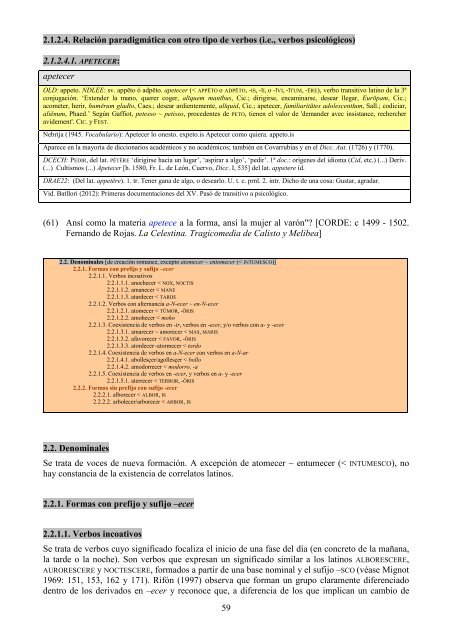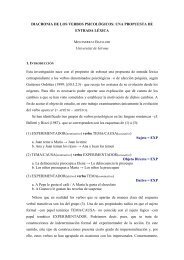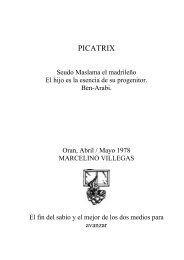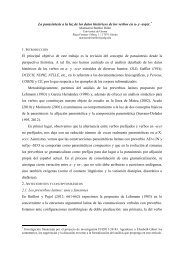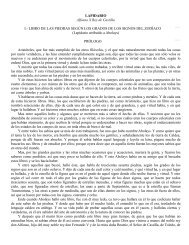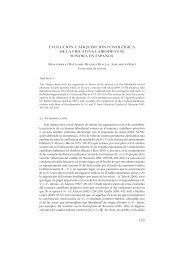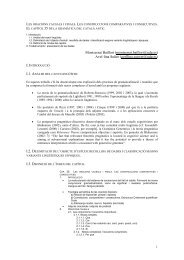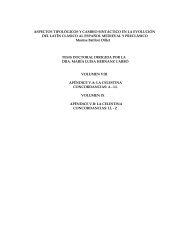Evolución e historia de los verbos con prefijo a- y ... - habilis - UdG
Evolución e historia de los verbos con prefijo a- y ... - habilis - UdG
Evolución e historia de los verbos con prefijo a- y ... - habilis - UdG
Create successful ePaper yourself
Turn your PDF publications into a flip-book with our unique Google optimized e-Paper software.
2.1.2.4. Relación paradigmática <strong>con</strong> otro tipo <strong>de</strong> <strong>verbos</strong> (i.e., <strong>verbos</strong> psicológicos)<br />
2.1.2.4.1. APETECER:<br />
apetecer<br />
OLD: appeto. NDLEE: sv. appĕto ó adpĕto. apetecer (< APPĔTO o ADPĔTO, -IS, -ĬI, o -ĪVI, -ĪTUM, -ĔRE), verbo transitivo latino <strong>de</strong> la 3ª<br />
<strong>con</strong>jugación. ‘Exten<strong>de</strong>r la mano, querer coger, alĭquem manĭbus, Cic.; dirigirse, encaminarse, <strong>de</strong>sear llegar, Eurōpam, Cic.;<br />
acometer, herir, humĕrum gladĭo, Caes.; <strong>de</strong>sear ardientemente, alĭquid, Cic.; apetecer, familiaritātes adolescentĭum, Sall.; codiciar,<br />
aliēnum, Phaed.’ Según Gaffiot, petesso ~ petisso, proce<strong>de</strong>ntes <strong>de</strong> PETO, tienen el valor <strong>de</strong> '<strong>de</strong>man<strong>de</strong>r avec insistance, rechercher<br />
avi<strong>de</strong>ment'. CIC. y FEST.<br />
Nebrija (1945. Vocabulario): Apetecer lo onesto. expeto.is Apetecer como quiera. appeto.is<br />
Aparece en la mayoría <strong>de</strong> diccionarios académicos y no académicos; también en Covarrubias y en el Dicc. Aut. (1726) y (1770).<br />
DCECH: PEDIR, <strong>de</strong>l lat. PĔTĔRE ‘dirigirse hacia un lugar’, ‘aspirar a algo’, ‘pedir’. 1ª doc.: orígenes <strong>de</strong>l idioma (Cid, etc.) (...) Deriv.<br />
(...) Cultismos (...) Apetecer [h. 1580, Fr. L. <strong>de</strong> León, Cuervo, Dicc. I, 535] <strong>de</strong>l lat. appetere íd.<br />
DRAE22: (Del lat. appetĕre). 1. tr. Tener gana <strong>de</strong> algo, o <strong>de</strong>searlo. U. t. c. prnl. 2. intr. Dicho <strong>de</strong> una cosa: Gustar, agradar.<br />
Vid. Batllori (2012): Primeras documentaciones <strong>de</strong>l XV. Pasó <strong>de</strong> transitivo a psicológico.<br />
(61) Ansí como la materia apetece a la forma, ansí la mujer al varón"? [CORDE: c 1499 - 1502.<br />
Fernando <strong>de</strong> Rojas. La Celestina. Tragicomedia <strong>de</strong> Calisto y Melibea]<br />
2.2. Denominales [<strong>de</strong> creación romance, excepto atomecer ~ entomecer (< INTUMESCO)]<br />
2.2.1. Formas <strong>con</strong> <strong>prefijo</strong> y sufijo –ecer<br />
2.2.1.1. Verbos incoativos<br />
2.2.1.1.1. anochecer < NOX, NOCTIS<br />
2.2.1.1.2. amanecer < MANE<br />
2.2.1.1.3. atar<strong>de</strong>cer < TARDE<br />
2.2.1.2. Verbos <strong>con</strong> alternancia a-N-ecer ~ en-N-ecer<br />
2.2.1.2.1. atomecer < TŬMOR, -ŌRIS<br />
2.2.1.2.2. amohecer < moho<br />
2.2.1.3. Coexistencia <strong>de</strong> <strong>verbos</strong> en -ir, <strong>verbos</strong> en -ecer, y/o <strong>verbos</strong> <strong>con</strong> a- y -ecer<br />
2.2.1.3.1. amarecer ~ amorecer < MAS, MARIS<br />
2.2.1.3.2. afavorecer < FAVOR, -ŌRIS<br />
2.2.1.3.3. ator<strong>de</strong>cer~atormecer < tordo<br />
2.2.1.4. Coexistencia <strong>de</strong> <strong>verbos</strong> en a-N-ecer <strong>con</strong> <strong>verbos</strong> en a-N-ar<br />
2.2.1.4.1. abollesçer/agollesçer < bollo<br />
2.2.1.4.2. amodorrecer < modorro, -a<br />
2.2.1.5. Coexistencia <strong>de</strong> <strong>verbos</strong> en -ecer, y <strong>verbos</strong> en a- y -ecer<br />
2.2.1.5.1. aterrecer < TERROR, -ŌRIS<br />
2.2.2. Formas sin <strong>prefijo</strong> <strong>con</strong> sufijo -ecer<br />
2.2.2.1. alborecer < ALBOR, IS<br />
2.2.2.2. arbolecer/arborecer < ARBOR, IS<br />
2.2. Denominales<br />
Se trata <strong>de</strong> voces <strong>de</strong> nueva formación. A excepción <strong>de</strong> atomecer ~ entumecer (< INTUMESCO), no<br />
hay <strong>con</strong>stancia <strong>de</strong> la existencia <strong>de</strong> correlatos latinos.<br />
2.2.1. Formas <strong>con</strong> <strong>prefijo</strong> y sufijo –ecer<br />
2.2.1.1. Verbos incoativos<br />
Se trata <strong>de</strong> <strong>verbos</strong> cuyo significado focaliza el inicio <strong>de</strong> una fase <strong>de</strong>l día (en <strong>con</strong>creto <strong>de</strong> la mañana,<br />
la tar<strong>de</strong> o la noche). Son <strong>verbos</strong> que expresan un significado similar a <strong>los</strong> latinos ALBORESCERE,<br />
AURORESCERE y NOCTESCERE, formados a partir <strong>de</strong> una base nominal y el sufijo –SCO (véase Mignot<br />
1969: 151, 153, 162 y 171). Rifón (1997) observa que forman un grupo claramente diferenciado<br />
<strong>de</strong>ntro <strong>de</strong> <strong>los</strong> <strong>de</strong>rivados en –ecer y re<strong>con</strong>oce que, a diferencia <strong>de</strong> <strong>los</strong> que implican un cambio <strong>de</strong><br />
59


